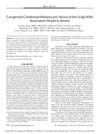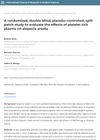 61 citations,
September 2010 in “Genomics”
61 citations,
September 2010 in “Genomics” The study found that immune responses disrupt hair growth cycles, causing hair loss in alopecia areata.
 40 citations,
August 2022 in “Frontiers in immunology”
40 citations,
August 2022 in “Frontiers in immunology” Blocking JAK/STAT pathways can help treat hair loss from alopecia areata.
 21 citations,
June 2017 in “Journal of The American Academy of Dermatology”
21 citations,
June 2017 in “Journal of The American Academy of Dermatology” Topical DPCP is somewhat effective for hair loss in alopecia areata, but more research is needed.
17 citations,
January 2019 in “Journal of cutaneous medicine and surgery” JAK inhibitors show promise for treating hair loss in alopecia areata but need more clinical trials to confirm safety and effectiveness.
 16 citations,
November 2005 in “Journal of Investigative Dermatology Symposium Proceedings”
16 citations,
November 2005 in “Journal of Investigative Dermatology Symposium Proceedings” Blocking interferon-gamma helps prevent and treat hair loss in Alopecia Areata.
 4 citations,
December 2016 in “Medical lasers”
4 citations,
December 2016 in “Medical lasers” Lasers can be effective for treating hair loss from alopecia areata.
 1 citations,
January 2020 in “Инфекционные болезни. Новости, мнения, обучение”
1 citations,
January 2020 in “Инфекционные болезни. Новости, мнения, обучение” Lack of vitamin D might cause hair loss due to autoimmune problems, and fixing vitamin D levels could help treat it.
 February 2024 in “Scientific reports”
February 2024 in “Scientific reports” Four genes are potential markers for hair loss condition alopecia areata, linked to a specific type of cell death.
 November 2023 in “The journal of investigative dermatology/Journal of investigative dermatology”
November 2023 in “The journal of investigative dermatology/Journal of investigative dermatology” Removing MCPIP1 from myeloid cells in mice leads to hair loss and prevents skin tumors but causes pigmented spots.
 June 2023 in “British Journal of Dermatology”
June 2023 in “British Journal of Dermatology” Baricitinib was effective and safe for severe hair loss treatment over 6 months.
October 2021 in “Journal of Investigative Dermatology” Blocking IL-12 can help treat alopecia areata by preventing hair follicle immune issues.
April 2019 in “The journal of investigative dermatology/Journal of investigative dermatology” A compromised gut may trigger the autoimmune hair loss condition Alopecia Areata.
16 citations,
January 2022 in “International journal of molecular sciences” Certain daily habits like stress, diet, and sleep can affect the severity of hair loss in alopecia areata.
 11 citations,
November 2019 in “Journal of the American Academy of Dermatology”
11 citations,
November 2019 in “Journal of the American Academy of Dermatology” Oral tofacitinib is a promising treatment for beard hair loss in alopecia areata.
 10 citations,
January 2019 in “Skin Research and Technology”
10 citations,
January 2019 in “Skin Research and Technology” Southern Chinese women with female pattern hair loss have less, thinner hair and smaller hair follicles.
 2 citations,
August 2020 in “Journal of Cosmetic Dermatology”
2 citations,
August 2020 in “Journal of Cosmetic Dermatology” Higher granulysin levels in the blood are linked to more severe hair loss in alopecia areata patients, and these levels decrease after effective treatment.
1 citations,
May 2017 in “InTech eBooks” New treatments focusing on immune pathways show promise for stubborn hair loss.
 April 2023 in “Journal of Investigative Dermatology”
April 2023 in “Journal of Investigative Dermatology” The research developed methods to test drugs that could protect and restore hair follicle protection in a hair loss condition.
January 2019 in “Egyptian Journal of Dermatology and Venereology /Egyptian Journal of Dermatology and Venerology” Low vitamin D levels might indicate more severe hair loss in alopecia areata patients.
 5 citations,
April 2015 in “HSOA journal of clinical dermatology & therapy”
5 citations,
April 2015 in “HSOA journal of clinical dermatology & therapy” Triamcinolone acetonide mesotherapy may be effective for treating patchy hair loss in alopecia areata.
 4 citations,
November 2021 in “Journal of Clinical Medicine”
4 citations,
November 2021 in “Journal of Clinical Medicine” Higher levels of CCL7 are linked to more severe hair loss in alopecia areata patients.
 3 citations,
August 2012 in “The American Journal of Dermatopathology”
3 citations,
August 2012 in “The American Journal of Dermatopathology” A man with a birthmark on his scalp developed hair loss that improved with treatment, but the link between the birthmark and hair loss was unclear.
 2 citations,
May 2022 in “Cosmetics”
2 citations,
May 2022 in “Cosmetics” Further research is needed to understand how the microbiome affects hair loss in Alopecia Areata.
 2 citations,
January 2020 in “Skin appendage disorders”
2 citations,
January 2020 in “Skin appendage disorders” Early onset, severe types, nail changes, family history, and body hair loss worsen alopecia areata prognosis; sticking to treatment helps.
 1 citations,
May 2017 in “InTech eBooks”
1 citations,
May 2017 in “InTech eBooks” The document concludes that alopecia areata is an unpredictable autoimmune hair loss condition with no cure, but various treatments exist that require personalized approaches.
December 2022 in “IntechOpen eBooks” 308 excimer phototherapy is a safe and effective way to treat hair loss from Alopecia Areata.
 July 2018 in “International Journal of Research in Medical Sciences”
July 2018 in “International Journal of Research in Medical Sciences” Platelet rich plasma was slightly more effective than no treatment for hair loss in alopecia areata patients.
 May 2022 in “Benha Journal of Applied Sciences”
May 2022 in “Benha Journal of Applied Sciences” Higher levels of PD-L1 are linked to more severe hair loss in people with Alopecia Areata.
April 2017 in “The journal of investigative dermatology/Journal of investigative dermatology” Researchers found three different ways drugs work to treat hair loss from alopecia areata and identified key factors for personalized treatment.
April 2024 in “Cosmetics” Wigs help improve self-esteem and quality of life for people with hair loss from alopecia areata.





















